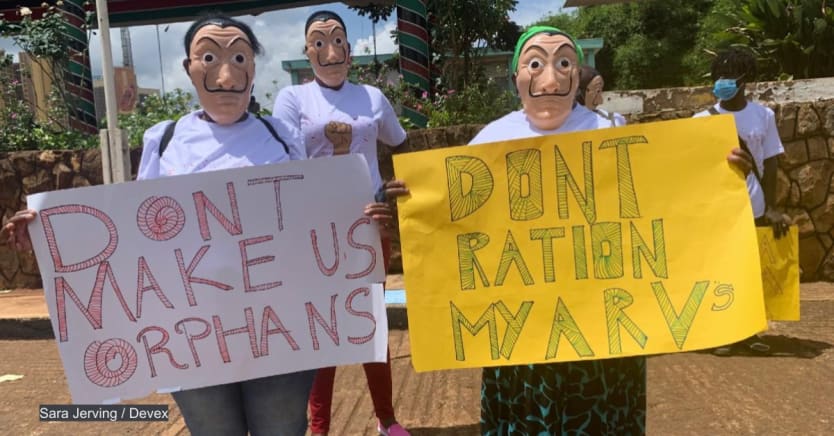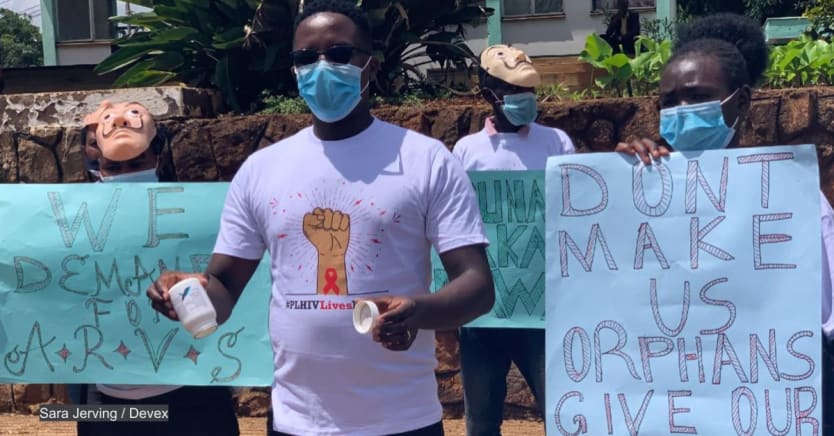
Levi Knowles has lived with HIV for 13 years but manages it through medication. He typically receives a three-to-six-month supply of antiretroviral therapy. But in recent months, the clinic has only given him enough drugs to last about a week.
This is because the Kenyan government has been in a stand-off with the U.S. Agency for International Development over a large batch of ARV doses and other donated health supplies that have been stuck at the port of Mombasa since mid-January.
Because of this, antiretroviral treatment in the country, which is needed for the 1.2 million HIV-positive people, is running “dangerously low,” according to civil society organizations. Treatment for children and lab reagents for testing HIV in babies are already completely out of stock. Most counties also don’t have tuberculosis tests.
As a result of the shortages and rationing Knowles has resorted to skipping doses as he can’t afford to go to the clinic every week.
“I’m playing with my immunity,” he said. “I don’t want to gamble with my life — but the government is gambling with my life.”
‘Holding us hostage’
Jane Gotiangco, a spokesperson for the U.S.-based private firm Chemonics explained that at the end of a five-year contract between USAID and the Kenya Medical Supplies Authority, USAID instead asked the Global Health Supply Chain-Procurement and Supply Management — implemented by Chemonics and a consortium of partners — to procure HIV, malaria, and family planning commodities for Kenya.
Civil society organizations in Kenya speculate that USAID decided to not use the Kenya Medical Supplies Authority for this shipment because of allegations of corruption and mismanagement of COVID-19 funds.
“[The standoff] risks rolling back decades of long gains made in the fight and management of HIV/AIDS.”
— Diana Gichengo, campaigns manager, Amnesty International KenyaIn response, the Kenyan government initially demanded 90 million Kenyan shillings ($832,000) in importation taxes on the drugs, saying it wasn’t a tax-exempt government to government donation, but has since waived these taxes. But according to a statement from local civil society organizations, the government is still insisting the drugs be delivered through its own system and not USAID’s private partner.
A U.S.-based health expert from a civil society organization operating in Kenya, who wished to remain anonymous, said the matter is at a standstill as the new U.S. administration sees this as a diplomatic issue, adding that the U.S. President's Emergency Plan For AIDS Relief refused to address the issue at the country's operational planning meeting for Kenya on Tuesday citing the same reason.
“For civil society that’s a slap in the face, because it's literally people’s lives. Access to your drugs right now — and we aren’t going to talk about it because it’s a diplomatic issue? No, it’s a life and death issue,” the source said.
A USAID spokesperson said the agency has "been working on this jointly with the Government of Kenya and other international donors … In order to achieve this, we are having urgent and ongoing diplomatic conversations with [Government of Kenya] representatives. We do not discuss diplomatic conversations publicly."
As a stop-gap measure, the Kenyan government made an arrangement with the Global Fund to Fight AIDS, Tuberculosis and Malaria to support the country with drugs for the next three months, these shipments started this week.

At a press conference in Nairobi on Tuesday, representatives from over a dozen civil society groups and people living with HIV said this recent shipment of drugs is only a bandaid to a larger problem, as it's unlikely to lead to multi-month supplies and will continue to result in people skipping doses.
“They take today, they skip tomorrow, so that they can extend the days before they go back to the clinic,” said Bernard Baridi, chief executive officer at Blast, an organization for young people living with HIV.
They emphasized that many people will likely skip doses because it's impractical for them to go to the clinic every week amid COVID-19 movement restrictions, taking time off of work, paying for transport each way, and risking COVID-19 exposure. People often travel long distances for their ARVs to avoid bumping into people they know at a clinic, because of the stigma surrounding HIV.
The CSOs warned that missed doses could increase mother-to-child transmission of HIV and sexual transmission of the disease. Interrupted treatment can also lead to opportunistic infections, such as tuberculosis, and HIV drug resistance.
They called upon the Kenyan Ministry of Health to inform the public about any reforms on government “leakages” and “wastages” to “restore donor confidence.” They also pleaded with USAID to immediately release the drugs to credible organizations operating in Kenya like NGOs or faith-based organizations.
“They are holding us hostage,” said Patricia Asero, treatment advocate and chairperson of the International Community of Women Living with HIV in Kenya.
Kenya's faith leaders preach knowledge about HIV
The Kenya National AIDS Control Council has drawn on religious texts to help faith leaders deliver science-based messages about HIV prevention, treatment, and stigma to their congregations.
In a press release issued Tuesday, Amnesty International’s Kenya office said it was “deeply concerned” about the drug shortages and the “lack of accountability” at Kenya Medical Supplies Authority.
The situation “risks rolling back decades of long gains made in the fight and management of HIV/AIDS,” said Diana Gichengo, campaigns manager for the organization.
Difficult memories
Shortages of HIV drugs in Kenya remind 24-year-old Queenter Mugweru of a darker time in the country’s history. Both her parents are HIV positive and the disease was passed along to her at birth.
When she was young, her parents didn’t have access to HIV drugs. At one point, her mother got very sick. Her parents would attend support groups preparing them to die. They wrote her a book of memories to remember them by, expecting they wouldn’t be around to raise her.
Thankfully, her parents survived, but her 1-year-old sibling died from the disease, making her an only child.
“I don’t want us to go back to where we once were. When I look at my parents, they look much better in comparison to those days,” Mugweru said. “HIV should not be something that keeps you in bed … not with all of the technology and where we are today.”








